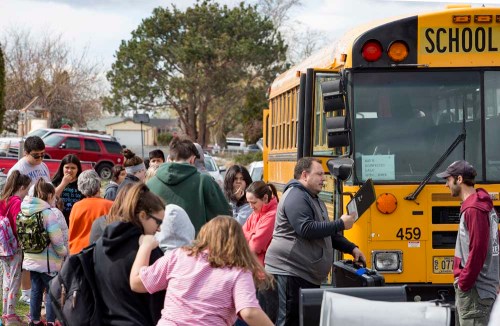Our view | Should Oregon block enrollment in online schools?
Published 5:00 am Wednesday, April 8, 2020

- Students, parents and volunteers crowd a bus dropping off school supplies to students of the Umatilla School District on April 3, 2020.
Education for children shouldn’t be another sacrifice made because of the COVID-19 pandemic. And all around Eastern Oregon parents and teachers are doing their best to ensure it doesn’t happen.
Mom and Dad can, in many cases, do wonders teaching their children any number of subjects. But teachers are the pros.
Trending
Public online schools are in a perfect position to help. They are already set up to educate children with a curriculum tailored to a computer connection. It’s what they do.
But could politics be getting in the way?
With Gov. Kate Brown’s school closure order, the schools can’t accept new students. Try to enroll your student in the Oregon Connections Academy — one of the state’s largest online schools — and you see this: “Due to Governor Brown’s Executive Order 20-08, as of March 27, 2020, the Oregon Department of Education has advised that no students are able to withdraw or enroll in any schools during the school closure. This closure lasts through April 28, 2020, and this timeline could potentially be extended. We recognize the confusion and burden this may put on your family. Thank you for your patience as we all navigate the impacts of COVID-19 and the regulations stemming from the Executive Order.”
Of course, if a flood of students leave traditional public schools and move to online education, it would dramatically reshape K-12 education in Oregon. When the students virtually move to online education, the real dollars go with them. Funding formulas are based on attendance. Traditional schools could be gutted. Teachers and other employees at conventional brick-and-mortar schools could lose their jobs. Can that be allowed to happen? Does Oregon need more economic disruption from the coronavirus?
The state’s public schools may already be in line to take an economic hit.
It was anticipated that the state’s new corporate activity tax would bring in $1 billion more a year for education. Will that still happen? Will the Legislature take action in the special session to try to ease this new burden on business?
Trending
Gov. Brown and the Oregon Education Association — representing some 48,000 school employees — have had their differences recently over changes to the state pension system. They are generally, though, in alignment on education issues. Was it the OEA’s influence that led to the enrollment ban for public online schools?
The answer is not really the most important issue. The real issue is to ensure students continue to get the best education they can. Traditional schools are doing their best to adapt. And we believe they will. But if parents decide it’s best for their children to attend an online public school, at what point should the state stop them — if any?









